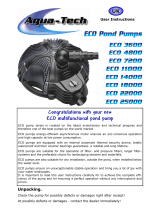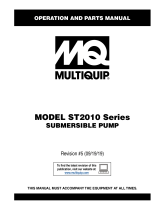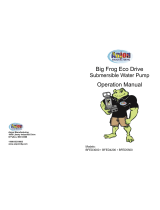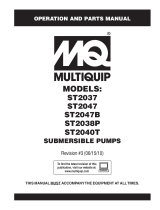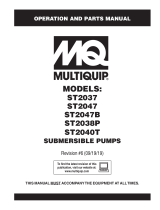5
1.3 Sound pressure level
The sound pressure level of the pump is lower than
the limiting values stated in the EC Council Directive
98/37/EC relating to machinery.
A-weighted sound pressure level
< 65 dB(A) in accordance with ISO 3743.
2. Electrical connection
The electrical connection should be carried out in
accordance with local regulations and following the
National Electrical Code. The pump should be
grounded. The operating voltage and frequency are
marked on the nameplate. Make sure that the motor
is suitable for the electricity supply on which it will be
used.
When connecting the pump for manual operation,
the 115V plug is inserted into a 115V outlet. If a float
switch is included for automatic operation it will be of
the "Piggy-back" design. Plug the 115V plug on the
float switch into the 115V outlet, and plug the 115V
plug from the pump into the float switch plug.
Fig. 2
3. Installation
3.1 Pipe connection
Steel or rigid plastic pipe can be screwed directly into
the 1.25" NPT discharge port. For permanent instal-
lation, it is recommended to fit a union, a non-return
valve and an isolating valve in the discharge pipe.
Other recommendations:
• For portable or temporary installations, plastic dis-
charge pipe can be used in conjunction with a
suitable screwed/hose connector.
• Removal of the pump should be by a cable
secured to the pump handle and not by the dis-
charge pipework.
• Screwed threads should be sealed using Teflon
®
tape.
Note: The pump must not be installed hanging from
the discharge pipe.
3.2 Basic requirements
When the pump is installed in a permanent installa-
tion with a float switch, and the cable length is set to
the minimum length of at least 2.5" inches, the mini-
mum dimensions of the well should be as shown in
fig. 3.
Furthermore, the well should be sized according to
the relation between the water flow to the well and
the pump capacity.
Fig. 3
3.3 Pump location and positioning
Pumps without or with float switch can be used in
vertical position with the discharge port uppermost or
in horizontal or tilted position with the discharge port
as the highest point of the pump. See fig. 4.
When used in horizontal position, the pump must be
completely covered by liquid.
Fig. 4
When the pipe/hose has been connected, the pump
is ready for use.
Note: Do not lift the pump by means of the electric
cable. Lift the pump by means of a cable secured to
the handle of the pump.
The Unilift KP pumps have built-in thermal
overload protection and require no addi-
tional motor protection. If the motor is
overloaded, it will stop automatically.
When it has cooled to normal temperature
it will start automatically.
TM03 4461 2106
As a precaution, the pump must be con-
nected to a socket with earth connection.
It is recommended to fit the permanent
installation with a ground fault circuit inter-
rupter (GFCI) with a tripping current
<30mA.
115V outlet
Float switch plug
("Piggy-back")
Pump plug
TM03 4330 2006TM00 1548 0493
‹
‹
‹
‹
‹
‹
‹
‹
‹
‹
‹
‹
‹
‹
‹
‹
‹
‹
‹
‹
‹
‹
‹
‹
‹
‹
‹
‹
‹
‹
‹
‹
‹
‹
‹
‹
‹
‹
‹
‹
‹
‹
‹
‹
‹
‹
‹
‹
‹
‹
‹
‹
‹
‹
‹
‹
‹
‹
‹
‹
‹
‹
‹
‹
‹
‹
‹
‹
‹
‹
‹
‹
‹
‹
‹
‹
‹
‹
‹
‹
‹
‹
‹
‹
‹
‹
‹
‹
‹
‹‹‹‹‹‹‹‹‹‹‹‹
‹‹‹‹‹‹‹‹‹‹‹
‹‹‹‹‹‹‹‹‹‹
‹‹‹‹‹‹‹‹‹‹
‹‹‹‹‹‹‹‹‹
‹‹‹‹‹‹‹‹
‹‹‹‹‹‹‹‹‹
‹‹‹‹‹‹‹‹‹
‹‹‹‹‹‹‹‹
‹
‹
‹
‹
‹
‹
‹
‹
‹
‹
‹
‹
‹
‹
‹
‹
‹
‹
‹
‹
‹
‹
‹
‹
‹
‹
‹
‹
‹
‹
‹
‹
‹
‹
‹
‹
‹
‹
‹
‹
‹
‹
‹
‹
‹
‹
‹
‹
‹
‹
‹
‹
‹
‹
‹
‹
‹
‹
‹
‹
‹
‹
‹
‹
‹
‹
‹
‹
‹
‹‹
‹
‹
‹
‹
‹
‹
‹
‹
‹
‹
‹
‹
‹
‹
‹
‹
‹
‹
‹
‹
‹
‹
‹
‹
‹
‹
‹
‹
‹
‹
‹
‹
‹
‹
‹
‹
‹
‹
‹
‹
‹
‹
‹
‹
‹
‹
‹
‹
‹
‹
‹
‹
‹
‹
‹
‹
‹
‹
‹
‹
‹
‹
‹‹
‹
‹
‹
‹
‹
‹
‹
‹
‹
‹
‹
‹
‹
‹
‹
‹
‹
‹
‹
‹
‹
‹
‹
‹
‹
‹
‹
‹
‹
‹
‹
‹
‹
‹
‹
‹
‹
‹
‹
‹
‹
‹
‹
‹
‹
‹
‹
‹
‹
‹
‹‹
‹
‹
‹
‹
‹
‹
‹
‹
‹
‹
‹
‹
‹
‹
‹
‹
‹
‹
‹
‹
‹
‹
‹
‹
‹
‹
‹
‹
‹
‹
‹
‹
‹
‹
‹
‹
‹
‹
‹
‹
‹
‹
‹
‹
‹
‹
‹
‹
‹
‹
‹
‹
‹‹
‹
‹
‹
‹
‹
‹
‹
‹
‹
‹
‹
‹
‹
‹
‹
‹
‹
‹
‹
‹
‹
‹
‹
‹
‹
‹
‹
‹
‹
‹
‹
‹
‹
‹
‹
‹
‹
‹
‹
‹
‹
‹
‹
‹
‹
‹
‹
‹
‹
‹
‹
‹
‹
‹
‹
‹
‹
‹
‹
‹
‹
‹
‹
‹
‹
‹
‹
‹
‹
‹
‹
‹
‹
‹
‹
‹
‹
‹
‹
‹
‹
‹
‹
‹
‹
‹
‹
‹
‹
‹
‹
‹
‹
‹
‹
‹
‹
‹
‹
‹
‹
‹
‹
‹
‹
‹
‹
‹
‹
‹
‹
‹
‹
‹
‹
‹
‹
‹
‹
‹
‹
‹
‹
‹
‹
‹
‹
‹
‹
‹
‹
‹
‹
‹
‹
‹
‹
‹
‹
‹
‹
‹
‹
‹
‹
‹
‹
‹
‹
‹
‹
‹
‹
‹
‹
‹
‹
‹
‹
‹
‹
‹
‹
‹
‹
‹
‹
‹
‹
‹
‹
‹
‹
‹
‹
‹
‹
‹
‹
‹
‹
‹
‹
‹
‹
‹
‹
‹
‹
‹
‹
‹
‹
‹
‹
‹
‹
‹
‹
‹
‹
‹
‹
‹
‹
‹
‹
‹
‹
‹
‹
‹
‹
‹
‹
‹
‹
‹
‹
‹
‹
‹
‹
‹
‹
‹
‹
‹
‹
‹
‹
‹
‹
‹
‹
‹
‹
‹
‹
‹
‹
‹
‹
‹
‹
‹
‹
‹
‹
‹
‹
‹
‹
‹
‹
‹
‹
‹
‹
‹
‹
‹
‹
‹
‹
‹
‹
‹
‹
‹
‹
‹
‹
‹
‹
‹
‹
‹
‹
‹
‹
‹
‹
‹
‹
‹
‹
‹
‹
‹
‹
‹
‹
‹
‹
‹
‹
‹
‹
‹
‹
‹
‹
‹
‹
‹
‹
‹
ø 350 mm
400 mm
16 inches
With float switch
14 inches












